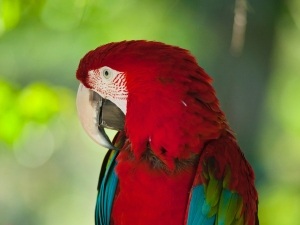
The appearance of your bird can tell you a lot about the health of your bird but a change in your bird’s appearance is not always bad.
This article is a look into why your parrot’s beak is turning black.
Table of Contents
Why is my parrot beak turning black?
Birds can have a variety of different colored beaks, parrots for one can have black, green, or light-colored beaks.
Knowing this, if your bird’s beak suddenly starts changing color from green or lightly colored to black then you know that something is going on with the bird.
This article is a look into why this may be happening:
Dark beak toys:
Your bird likely enjoys its toys and plays with them to no end, but this could be the reason why your parrot’s beak is starting to turn black.
If the bird rubs on the toy too much, to a point where the paint on the toy starts to wear off, then the paint may land on the bird’s beak and cause the bird’s beak to start to look black.
What to do:
You can quickly and easily determine if this is the reason why your bird’s beak is black by using a warm damp cloth to remove the color off of your bird’s beak.
Do this gently, if you put too much pressure on the bird’s beak, and the beak is actually bruised, then this may be painful for the bird.
It’s a bruise:
Bruises can develop all over the bird’s body, on the beak included.
Your parrot’s beak is made up of an inner bony layer and a layer of keratin on top, there are blood vessels that run through these layers of keratin.
If your bird suffers an injury, if the bird falls on the beak, or if the bird gets into a fight and the other bird bites or pecks at its beak then this can cause the blood vessel to become damaged and cause blood to pool under the keratin later making the bird’s beak look black.
What to do:
As long as the bird isn’t showing any signs of distress and is eating normally the bird will be fine.
The bruise will grow out as the keratin on the bird’s beak grows out and the bid will file it off through everyday use.
If your bird seems to be in distress or in pain, or if the bird can’t eat on its own then you may need to take the bird to the vet to be examined and treated at the vet.
Fatty liver disease:
If you’ve been feeding your bird a diet of mainly seeds then your bird may have fatty liver disease and this may be why the bird’s beak is turning black.
Fatty liver disease is quite a common disease but it can be quite dangerous. The disease can cause your bird to develop blood clots anywhere on the bird its body, including its beak.
A blood clot in the bird’s blood vessels can be seen on the outside and will look like the bird has a black beak.
What to do:
Taking your parrot to the vet to be examined is recommended, the vet will be able to accurately determine if this is what is wrong with your bird through testing.
After the diagnosis, the vet will offer treatment and you would have to change your bird’s diet to a pellet feed and fresh healthy foods
If you enjoyed this article then you may also be interested in other bird related articles. Here are some articles that you may be interested in: Why Do Birds Rub Their Beaks On The Fence, My Budgie’s Beak Is Crusty, Why Does My Sun Conure Click His Beak, Why Do Birds Drag Their Beaks, Why Is My Love Bird’s Beak Turning Black?, Baby Lovebird Beak Black

